As part of the Al Jazeera Media Forum in Doha from March 11 to 13, the Al Jazeera Media Institute is organizing its first conference entitled ” Artificial Intelligence in the media “. The conference will kick off on Monday, March 13, 2023 at the Rotana city center hotel.
“Artificial Intelligence” technologies are revolutionizing business concepts in several areas, and experts believe that the very rapid growth of this technology is affecting human life in all areas of its activity.
According to the reports of the World Economic Forum 2020, the jobs of the future are moving towards robotics, big data, artificial intelligence systems, blockchain technology, and other developed technologies that are on their way to replace a lot of current jobs, and this challenge has become the most important priority that universities, institutes, and specialists in training and education should take into account when drawing up their strategic plans.
Al Jazeera Media Institute believes that there is a need to hold more in-depth and extensive discussions with specialists and experts on the ongoing debate on the impact of artificial intelligence technology on the media in general and the Arab media in particular, to understand what this technology is and determine its impact in the media field.
As Al Jazeera Media Institute is one of the global leaders in the field of media training and development, and aims to improve the level of media training and development at all local and international levels, the institute has found, in this pioneering media initiative to organize the “conference on the impact of Artificial Intelligence technology and designing the future of media; Opportunities-challenges-Ethics”, an opportunity to shed light on the future of the media and examine the extent to which it is affected by artificial intelligence technology.
The conference seeks to achieve the following objectives:
1- Raising awareness of Artificial Intelligence technologies and the future of jobs in the field of media.
2- Contribute to opening new horizons for the use of Artificial Intelligence technologies in the fields of media and media training.
3- Establishing a sustainable partnership with local and international institutions working in the field of Artificial Intelligence.
4- Developing initiatives and projects related to Artificial Intelligence in the field of media and media training.
The conference will discuss the following topics:
First topic/session: Artificial Intelligence applications in the media sector-opportunities and challenges
Topic/Session 2: Artificial intelligence: knowledge economy and media ethics
Topic/Session 3: Arab media in the age of artificial intelligence
Workshop: Towards developing the performance of the Arab media using Artificial Intelligence and cybersecurity awareness
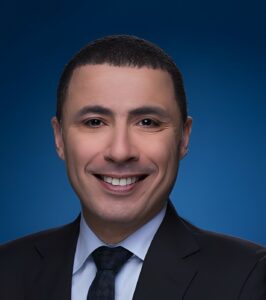
Dr. Yaser Bishr is a Venture Partner at Rising Tide Fund based in Silicon Valley, where he oversees the firm’s Web 3, AI, and deep technology investments. He also serves as a Senior Advisor to Sheikha Al Mayassa Bint Hamad Al Thani, providing guidance on digital transformation and investments. Previously, Dr. Yaser held the position of Executive Director of Digital at Al Jazeera Media Network, where he was responsible for launching AJ+ and establishing the Digital Division. Prior to joining Al Jazeera, he served as Vice President at Lockheed Martin, where he led the company’s global Intelligence Solutions. Dr. Yaser holds a Ph.D. in AI and an MBA from Duke University.

Luo Yangen, is the Director of Artificial Intelligence of Technology Center of Xinhua News Agency. He received his master’s degree in computer technology at University of Chinese Academy and Sciences. He is committed to the research and implementation of artificial intelligence in the field of news media, leading the creation of Xinhua News Agency’s artificial intelligence capabilities, completing the construction of large-scale pre-training models for multimodal news domain, participating in building artificial intelligence content generation platform, developing and completing “Xinhua JiaoZhen” intelligent audit algorithm platform construction, achieving great social and economic benefits. In addition, he actively empowers news reporting, participates in creating several popular integrated media reporting products.

Dr. Ahmed Elmagarmid is the founding Executive Director of Qatar Computing Research Institute (QCRI) and an Emeritus Professor of Computer Science at Purdue University. He has been spearheading QCRI since 2010, with a focus on large-scale computing challenges that address national grand challenges. Dr. Elmagarmid actively participates in many Qatar strategic initiatives, including serving on the research committee for Sidra Medicine, the board of directors for Qatar Science and Technology Park (QSTP), and MEEZA, a leading national/regional cloud provider.
Dr. Elmagarmid founded the National Cyber Security Research Lab (NCSRL), which functions in an advisory capacity to Qatar’s government to transform Qatar into a world leader in cybersecurity innovation. He also played a significant role in developing Qatar’s National Artificial Intelligence Strategy, which features recommendations to accelerate the commercial development of AI-enabled technologies. Moreover, he has advised Qatar’s Ministry of Interior and Ministry of Transportation and Communication to implement national security and artificial intelligence strategies.
Recognizing the importance of a healthy society to Qatar’s sustainability, Dr. Elmagarmid is an inaugural board member of the Qatar Personalized Medicine Institute (QPMI) and the Qatar Genome Programme, where he serves as a national committee founding member and supports the organization’s efforts to map the genome of Qatar’s population.
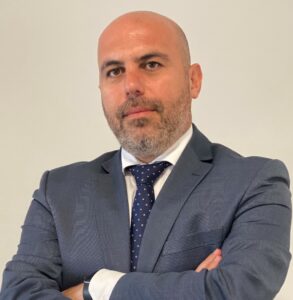
Chady is the Data & AI regional Lead at Microsoft, tasked with
democratizing and expanding with his team the use of Artificial intelligence and advanced Analytics in the Middle-East cluster.
With over 22 years of experience, Chady has spent the last 7 years at Microsoft in numerous leadership roles developing the cloud business and working with enterprise and public sector customers to democratize technology and scale digital experiences to become a data-driven organization while embracing a data culture to thrive today and into the future.
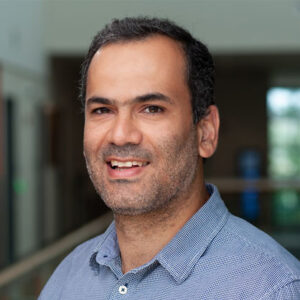
Dr. Nassar is an assistant professor of computer science and cybersecurity and the coordinator of the master’s in cybersecurity and networks at the University of New Haven (UNewHaven), where he actively teaches topics in programming, artificial intelligence, data science, and cybersecurity. Before joining UNewHaven, Dr. Nassar was an assistant professor of computer science at the American University of Beirut (AUB), Lebanon. Dr. Nassar received his research master’s degree in computer science in 2005 and his Ph.D. in 2009, both from France. His research interests cover the topics of security and privacy applied to artificial intelligence and machine learning.

Dr. Chawki is a Senior Partner Sales Engineer at Google Cloud who is responsible for building Google Cloud Data and AI ecosystem in Qatar, Kuwait, and Oman. He is also Data and AI champion at the META region.
He founded and led a Data Science COE in the MEA region, that helped CDOs in setting-up and executing Data and AI strategies. He is a board member of several Universities. He also delivers lectures in the Data and AI space. With more than 25 years’ experience in Data, AI and Business Automation across various industries and geographies, who has led large multicultural teams of qualified professionals.
He has published 8 papers in international journals and conferences in the areas of Cognitive Sciences and Active Databases.

George Mikros is a Professor at the MA Program of Digital Humanities at HBKU. He was Professor of Computational and Quantitative Linguistics at the University of Athens Greece.
Mikros is the director of the Computational Stylistics lab. He is also Professor at the Department of Applied Linguistics at the University of Massachusetts, Boston, USA. He had the position of Research Associate at the Institute for Language and Speech Processing. Prof. Mikros has authored 5 monographs and more than 80 papers published in peer-reviewed journals, conference proceedings, and edited volumes. Since 2007 he has been elected as Member of the Council of the International Association of Quantitative Linguistics (IQLA). In 2018 he was elected its President. He is a keynote speaker and invited speaker in many international conferences, workshops and summer schools related to Digital Humanities and Quantitative Linguistics.

Is a specialist in the field of human rights and the media. She obtained a master’s degree in communication sciences from the University of California, Santa Barbara, and a bachelor’s degree in political science from the American University of Beirut. Ms. Chaheen has extensive experience in the field of media, as she assumed the position of media officer for the East Office Middle and North Africa at the Office of the United Nations High Commissioner for Human Rights in 2011, in addition to that; she was the spokesperson for the Special Envoy for Syria from May 2015 until the end of 2016. She worked for the International Committee of the Red Cross as the official spokesperson for the Arabic language, and for the Lebanese newspaper The Daily Star as a journalist.

Senior lecturer / A/V Solutions Consultant
University of Doha for Science & Technology, he has held different professional roles ranged from an associate producer, academic instructor, production manager, senior cinematographer, video editor and staff photographer. in 2018, he expanded portfolio with a PhD research inspired by the fast-evolving world of visual communication. As a part of the UDST team, he translated his experience into the classroom, enabling new generations of media professionals to navigate the complex realm of the global Internet village. His principal research interests are immersive XR technologies and mobile media
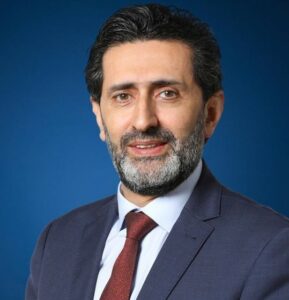
Asef Hamidi is the Director of News at Al Jazeera since 2015. Since joining Al Jazeera, he has held a number of high-profile media positions within the company and has contributed to the coverage of many important international and regional events. He has written several books on media, including “Radio and Television Work – Keys to Success and Creative Secrets,” “Writing for Images,” and “Television Correspondent Guide.”

Zahra Rasool is a two-time Emmy-nominated director, writer, producer, and media entrepreneur whose storytelling and innovation centers marginalized communities and people of color.
Throughout 10 she has directed, written, and produced numerous documentaries and creative fiction projects, as well as advertising campaigns and immersive experiences.
In 2017, she created and launched a media innovation and storytelling studio, AJ Contrast, part of Al Jazeera Media Network.

Hassan Bin Ali Al-Ajmi is a co-founder and partner of the International Cybersecurity Solutions Company. He holds two master’s degrees, the first in electronic crimes and cybersecurity from the University of Liverpool in the United Kingdom, and the second in disaster management from Bournemouth University in the United Kingdom. He is also a specialist in ethical hacking and internet crime investigation since 2010. Mr. Hassan has over 18 years of practical experience in information security, technology empowerment, crisis and disaster management, and business risk management.

Jim Jansen is a principal scientist in the social computing group at the Qatar Computing Research Institute, Professor in the College of Science and Engineering, Hamad bin Khalifa University, and Adjunct Professor at the College of Information Sciences and Technology at The Pennsylvania State University. He is a graduate of West Point and has a Ph.D. in computer science from Texas A&M University, along with master’s degrees from Texas A&M (computer science) and Troy State (international relations).
Jansen has authored or co-authored four books with more than three hundred (300) research publications, with articles appearing in a multi-disciplinary and extremely wide range of journals and conferences.

He is a Cloud & Data Science Executive with experience in innovative Senior Business Systems Architect and a proven ability to initiate, develop and implement programs, projects, and applications across a broad spectrum of business areas for companies of diverse backgrounds and size. He has an exceptional understanding of both technical principles and business concepts excels at identifying areas for technical and business process enhancement and expansion and taking initiative to successfully realize improvements.
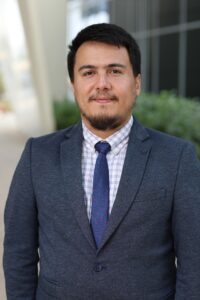
Assistant Professor at the University of Doha for Science and Technology in Doha, Qatar. He received his BS degree from the Department of Electrical and Electronics Engineering at Middle East Technical University in Ankara, Turkey in 2011, followed by his MSc degree from the Department of Electrical and Electronics Engineering at TOBB University of Economics and Technology in Ankara, Turkey in 2013. He earned his Ph.D. degree from the Electrical and Computer Engineering Department of Florida International University in Miami, FL, USA in 2017. As a researcher, Bekir Sait Ciftler focuses on Communication, Privacy, Security, and Explainability for Artificial Intelligence and Machine Learning Applications. Prior to joining the University of Doha for Science and Technology, he was a postdoctoral researcher at Hamad Bin Khalifa University (Qatar Foundation, Doha, Qatar). Additionally, he worked as a Machine Learning Researcher/Solution Architect for P.I. Works in Istanbul, Turkey, from 2017 to 2019, and as a Visiting Research Assistant at North Carolina State University in Raleigh, NC from August 2016 to August 2017. In 2016, he had an internship at Mitsubishi Electric Research Laboratories (MERL) in Boston, MA, USA.
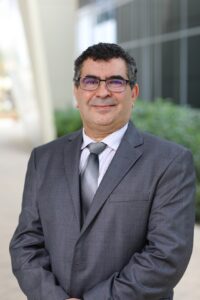
Ahmed Elwhishi,received the BS degree in computer engineering from Tripoli University, Libya, in 1993, and the MSc and PhD degrees from the Electrical and Computer Engineering Department, University of Waterloo, ON, Canada, in 2006 and 2012, respectively. He is now an assistant professor in the Department of Data Science and AI, University of Doha for Science and Technology, Qatar. His research interests are in the areas of machine learning, optimization techniques, wireless mobile networks, IoT systems.
The first session:
Applications of Artificial Intelligence in the Media field -opportunities and challenges-
* The use of Artificial Intelligence in the Media field
* Areas of application of Artificial Intelligence and the role it plays in editorial and journalistic writing
* Areas of application of Artificial Intelligence and its role in verifying the truthfulness/accuracy of news
* Privacy protection system and Data Ownership Legislation
Second session:
Artificial Intelligence: Knowledge economy and Media ethics
* Artificial Intelligence and digital Media economics (financial, technical resources and specialized Media professionals)
* Conflict of interest between robotic marketing and the Media content industry
* The dominance of technology companies in the news industry through technology algorithms
* Ethics of Artificial Intelligence and the societal impact of the use of Artificial Intelligence in the Media
Third session:
The state of Arab Media in the age of Artificial Intelligence
* Digital transformation and Artificial Intelligence in the Arab Media content industry
* The extent of the impact of Artificial Intelligence on the structure, responsibility and function of the Media organization (experience of the Aljazeera Media network)
* Using Artificial Intelligence in news stories and virtual reality experience
* The use of Artificial Intelligence in the Media training centers and academic programs of university institutions
Workshop: Artificial Intelligence and cybersecurity